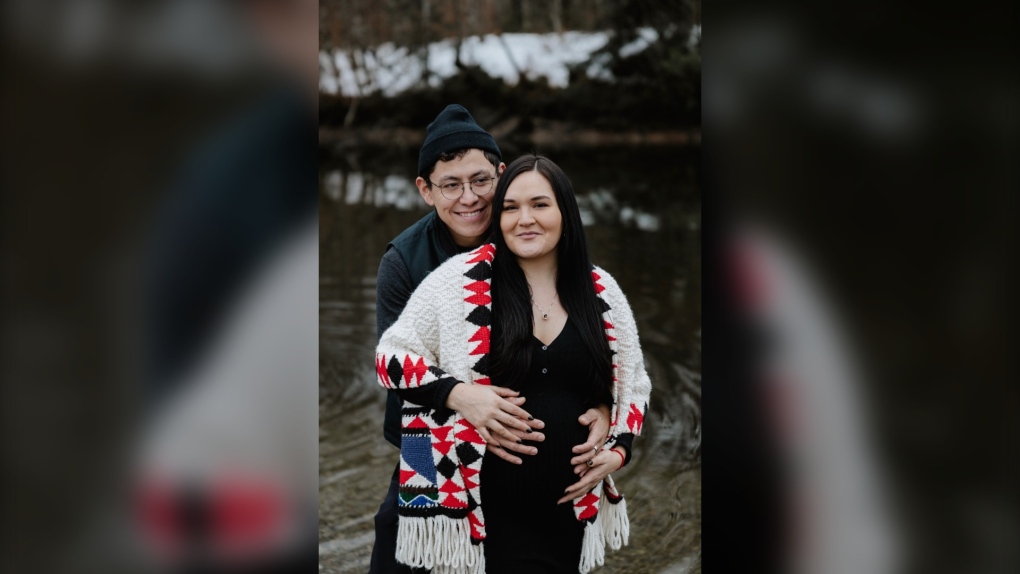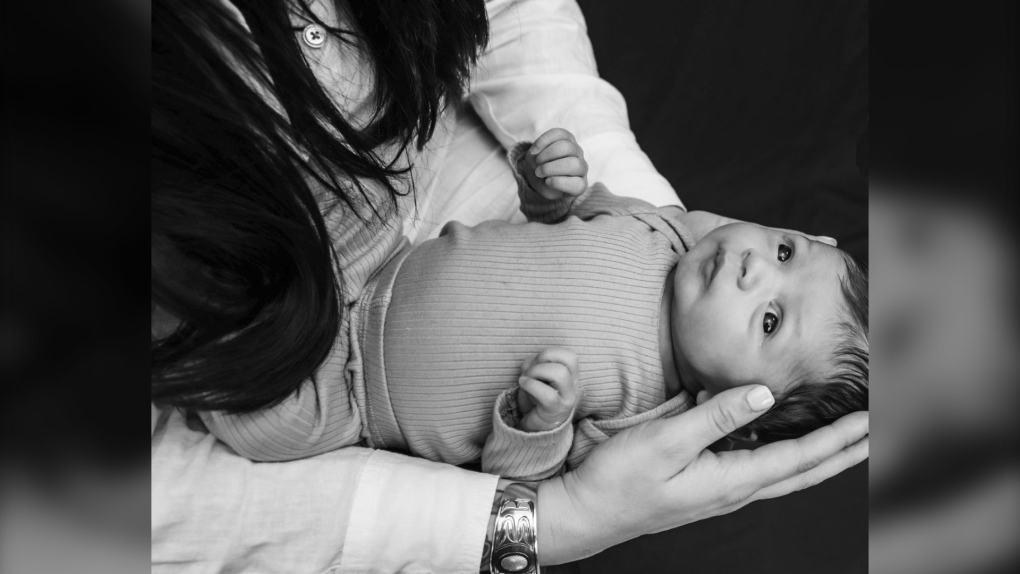'It feels like it's losing dignity': B.C. parents unable to register baby with Indigenous name
For Salia Joseph and her partner, giving their newborn daughter a Sḵwx̱wú7mesh sníchim (Squamish language) name was an important way to honour her heritage, and to continue the work of reclaiming and revitalizing Indigenous languages.
Joseph, whose ancestral name is St’ax̱í7aluts, is from Sḵwx̱wú7mesh Úxwumixw (the Squamish Nation). Her partner Joseph Currie is Cree from the Montana Indian Band and Blackfoot from the Piikani Nation.
Born in North Vancouver on March 1, their baby girl was named Alíla7 – which means wild raspberry. Ever since, her parents have been trying to register her birth and her name, but the province won’t recognize the ‘7’ as a valid character.
“My partner and I are both Indigenous,” Joseph said. “We're raising our daughter in Squamish territory. I am a language learner and advocate. Our language is really important to me.”
Joseph is the executive director of the Sníchim Foundation, a non-profit dedicated to language learning and revitalization. For her and her partner, giving their daughter an Indigenous name and raising her to speak her language is part of a larger effort to make sure Indigenous languages are not lost.
“The idea of having a Squamish name for our daughter felt like a part of a really exciting time, and the result of so much labour from our ancestors to keep our language alive and to keep it so that we could be using it today,“ she said.
“In my eyes, keeping our language and our culture relevant is embodied first by being able to start in our own house, and start with our kin.”
 Salia Joseph and her partner, Joseph CurrieSo when She realized the province wouldn’t allow her to enter the 7 in her daughter’s name, and felt compelled to follow up with B.C.’s Vital Statistics Agency.
Salia Joseph and her partner, Joseph CurrieSo when She realized the province wouldn’t allow her to enter the 7 in her daughter’s name, and felt compelled to follow up with B.C.’s Vital Statistics Agency.
“The ‘7’ is really important in our language. It's very distinct to Squamish, and I really didn't want to compromise on that. I figured it would be OK because a seven is on everybody's keyboard,” she said.
After she contacted the agency, she was told she could work around the online form and submit a paper copy through the mail.
“I was very early post-partum, filling out documents, waddling my way to the post office to deliver it,” she said.
But once again, the name she and her partner had chosen for their daughter was rejected because the 7 is not one of the approved “special characters,” and numbers are not allowed.
“I just said to them, ‘That's not good enough.’ If I spell her name wrong on that, it means I can't spell her name correct on any of her ID because it won't match. Her birth certificate, her SIN card, her passport, her care card – all of that has to be spelled incorrectly,” Joseph said.
“It also rules out lots of Squamish people who have 7 in their names who will now know that they aren't eligible to see themselves represented correctly.”
The 7 is a common character in the Squamish language, and signifies a brief pause between syllables.
“Elder speakers in cooperation with linguists developed this character in the late 1960s while translating these oral languages into written form,” according the Squamish Lilwat Cultural Centre.
PROVINCE, FEDS PLEDGE ACTION ON RECLAIMING INDIGENOUS NAMES
Joseph points to Article 13 of the United Nations Declaration on the Rights of Indigenous Peoples (UNDRIP), which specifically addresses the use of Indigenous languages, writing systems and names.
“Indigenous peoples have the right to revitalize, use, develop and transmit to future generations their histories, languages, oral traditions, philosophies, writing systems and literatures, and to designate and retain their own names for communities, places and persons,” the declaration reads.
On Wednesday, B.C. released an 89-point action plan for upholding UNDRIP, with changes to be implemented over the next five years. One of the actions points to a possible solution to the situation Joseph is currently struggling with.
The province will “adopt an inclusive digital font that allows for Indigenous languages to be included in communication, signage, services and official records,” the plan says.
In the meantime, Joseph says the solution she is being offered isn’t at all adequate, saying she’s been told just to use an Anglicized version of her daughter’s name, and to pursue a correction some time in the future.
“Being forced to pick an English name when that isn't our choice feels very reminiscent of many of the ancient struggles that our ancestors have had to go through,” she said.
“It feels like it's losing dignity, that Squamish has to be watered down and I don’t want that for her. I don't want that for our language or our people, and the many other people that have sevens in their names in their traditional names or their given names that want to be represented fully.”
Further, she questions when and whether the change will actually be possible, and what kind of paperwork and fees will be required.
Last year, the federal government announced a process for First Nations, Inuit and Métis people who were stripped of their names in the residential school system or the '60s Scoop to reclaim them on identification documents. All associated fees will be waived. The move was a response to one of the 94 Calls to Action of the Truth and Reconciliation Commission in 2015.
However, the rules outlined by the province for those pursuing this option put constraints on what is possible. Single names are not allowed, numbers can not be included, and “special characters” are limited to apostrophes, periods, hyphens, and French-language accents on vowels.
“Squamish has been spoken here, where I'm from, for thousands of years. English has been spoken here for a couple hundred. That is colonialism, that is white supremacy in action that prioritizes English and French over any and all Indigenous languages of these territories,” Joseph said.
Asked about the issue Thursday, Health Minister Adrian Dix said he understands that situations like Joseph’s can be “distressing,” and pointed to the commitment detailed in the province’s newly-release action plan.
“I think we've made a number of active changes in this area of governance around names and giving people agency around that and certainly we're working to do it as soon as possible. We're committed to acting on this,” he said.
The ministry elaborated in a written statement, saying it understands the limitations of the system are frustrating for families, and have a disproportionate impact on Indigenous people.
“We are aware that parents have been unable to register the births of their children with names that include certain characters,” the statement said.
“We are committed to ensuring that Indigenous languages are living, used, taught and visible throughout their respective territories and across the province – and that includes ensuring that parents can register the births of their children with traditional names.” the statement states.
 Newborn Alíla7 Joseph Currie in her mother's arms
Newborn Alíla7 Joseph Currie in her mother's arms
Joseph says she hopes sharing her story will pave the way for these changes to be made, saying it is a critical part of reconciliation.
“My dad is a day school survivor, my grandparents are residential school survivors. Same with my partner. It's the same with native people all over. Their ancestors were not allowed to speak their language and as a result, so many of our family members don't,” she said.
“Squamish people were told for generations that their language was backwards, that they were dumb, or that their language was outdated. To see people reclaiming it, to see it spoken openly, to see people claiming it proudly is really healing – and can't be underestimated.”
CTVNews.ca Top Stories

Bird flu, measles top 2025 concerns for Canada's chief public health officer
As we enter 2025, Dr. Theresa Tam has her eye on H5N1 bird flu, an emerging virus that had its first human case in Canada this year.
Azerbaijan observes day of mourning for air crash victims as speculation mount about its cause
Azerbaijan on Thursday observed a nationwide day of mourning for the victims of the plane crash that killed 38 people and left all 29 survivors injured as speculation mounted about a possible cause of the disaster, with some experts saying that the airliner was damaged by Russian air defence fire.
6,000 inmates stage Christmas Day escape from high-security Mozambique prison
At least 6,000 inmates escaped from a high-security prison in Mozambique's capital on Christmas Day after a rebellion, the country's police chief said, as widespread post-election riots and violence continue to engulf the country.
Christmas shooting at Phoenix airport leaves 3 people wounded
Police are investigating a Christmas shooting at Sky Harbor Airport in Phoenix that left three people injured by gunfire.
Working Well: Returning to the office can disrupt life. Here are some tips to navigate the changes
Heading into 2025, thousands of workers face an unsettling reality: after years of working from the comfort of home, they must return to the office full-time for the first time since the coronavirus pandemic or look for new work.
Donald Trump says he urged Wayne Gretzky to run for prime minister in Christmas visit
U.S. president-elect Donald Trump says he told Canadian hockey legend Wayne Gretzky he should run for prime minister during a Christmas visit but adds that the athlete declined interest in politics.
New York taxi driver hits 6 pedestrians, 3 taken to hospital, police say
A taxicab hit six pedestrians in midtown Manhattan on Wednesday, police said, with three people — including a 9-year-old boy — transported to hospitals for their injuries.
Prayers and tears mark 20 years since the Indian Ocean tsunami that killed some 230,000 people
People gathered in prayer and visited mass graves in Indonesia’s Aceh province on Thursday to mark 20 years since the massive Indian Ocean tsunami hit the region in one of modern history’s worst natural disasters.
Historical mysteries solved by science in 2024
This year, scientists were able to pull back the curtain on mysteries surrounding figures across history, both known and unknown, to reveal more about their unique stories.
































